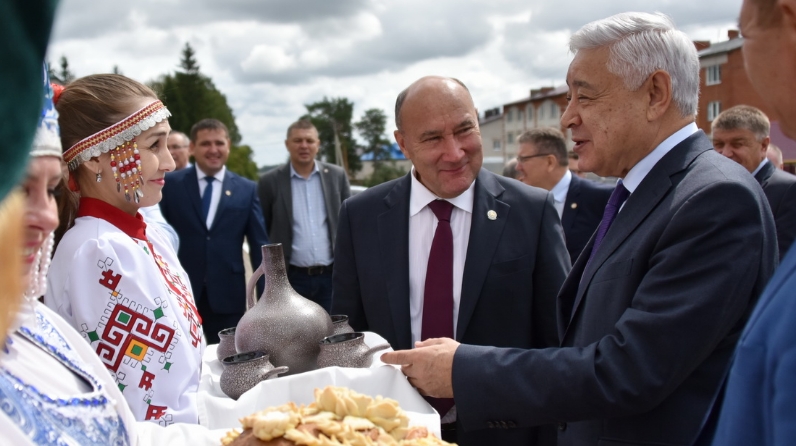Marat Akhmetov called the development of agricultural cooperation a priority for the coming years

Today in the Aksubaevsky district a zone seminar-meeting was held on increasing business activity of the rural population. The Chairman of the State Council of the Republic of Tatarstan Farid Mukhametshin, the Deputy Prime Minister of the Republic of Tatarstan - Minister of Agriculture and Food of the Republic of Tatarstan Marat Akhmetov, the Deputy Minister Rishat Khabipov, heads of districts and rural settlements, heads of private farms and family farms took part in the discussion of promoting entrepreneurship representatives of farmer associations, consumer societies and agricultural cooperatives from 11 regions of the republic.
This year, meetings with regional activists are held in a new format of “live communication”. Each participant has the opportunity to ask his question or raise an urgent problem, which can often be resolved directly “on the spot”, since the seminars are attended by heads of relevant ministries and departments, representatives of the banking sector and heads of municipalities. This communication format also allows to share experiences and get acquainted with the best practices of organizing and managing the economy in the republic.
Before the meeting, the participants visited the farms of the Aksubaevsky district. Last October, Vladimir Balandov received a grant of the Ministry of Agriculture of the Republic of Tatarstan in the amount of 3 million rubles for the development of dairy cattle breeding. Today, his farm contains more than 40 heads of cattle, including 10 dairy cows. Currently, Vladimir Ilyich is completing the construction of a dairy farm for 30 dairy cows.
The farm of Valery Sapeev, which was also visited today by the seminar participants, is one of the strongest in the village of Tarkhanka. Valery Dmitrievich has been engaged in farming since 2013. Six years ago, Valery Sapeev also received a grant from the Ministry of Agriculture of the Republic of Tatarstan in the amount of 1 million rubles for poultry farming. Today he grows chickens, ducks, geese, turkeys - about 30 thousand heads. He plans to launch a poultry processing plant. In addition, he additionally opened a carpentry, turning and welding workshop, a feed workshop, and laid an apple orchard on an area of 3 hectares. Valery Sapeeev is also known as a philanthropist who has done a lot for the development of his native village - he built a road and arranged a pond. Today, his farm business has already become a family business, his sons are working with him.
Opening the plenary part of the meeting, Farid Mukhametshin noted that today more than half of the republic’s agricultural output falls on farms and private farmsteads. Among the most important problems in the arrangement of the village, the head of the parliament of the republic outlined the employment of the rural population and ensuring high profitability of rural labor. The villagers should have work, and this depends not only on themselves, but also on the activity of the leaders of the settlements, as said the Chairman of the State Council. “There are heads of municipalities in the republic who have achieved high results while supporting the business activity of the population,” said Farid Mukhametshin, “the inclusion of villagers in work in the community is a priority for today.”
A vivid example was given by the investor and farmer Anatoly Samarenkin. In his native village of Mokshino, he created a mushroom cultivation plant. Today he employs 25 people, but his main achievement, he believes, is that three families have already abandoned the idea of moving to Kazan.
As noted by Marat Akhmetov, more than 2 billion rubles from the federal and republican budgets are allocated annually to support small business forms, including almost 1.4 billion rubles from grant support and 566 million rubles from subsidies to private household plots. By the past year, according to Marat Akhmetov, support has grown by more than half a billion rubles. The programs on subsidizing private household plots for the conservation of cows, the construction of mini-farms, and the purchase of heifers and poultry are among the most popular. Over 5 years, more than 1800 mini-farms were built, including 257 this year.
One of the important tools for preserving living creatures in the courtyard is rent of unit lands, - the head of the relevant ministry believes. Its recommended amount is 750 rubles / ha. Marat Akhmetov persistently asked all the heads of municipalities to pay attention to this.
The priority is the development of agricultural cooperatives. By the federal program, 4 cooperatives have already received grants (the total amount of the grant amounted to 88 million rubles), today the acceptance of applications for second stage of the competition is coming to an end. Two days ago, the Agrostartup program was launched in the republic as part of a national project to provide grant support to novice farmers.
The meeting was held in the format of active discussion of farmers' issues. There were questions from the audience related to receiving subsidies for poultry and cattle breeding, transferring land from one category to another, access to credit for rural businesses, garbage collection, provision of clean drinking water, and the retention of young specialists in rural areas. The villagers also proposed to create a school with an agricultural bias in order to teach children to peasant labor from childhood. All questions of today, deputies, relevant ministries and departments, the Council of municipalities have been put to work. The answers will be announced at the next series of such meetings.